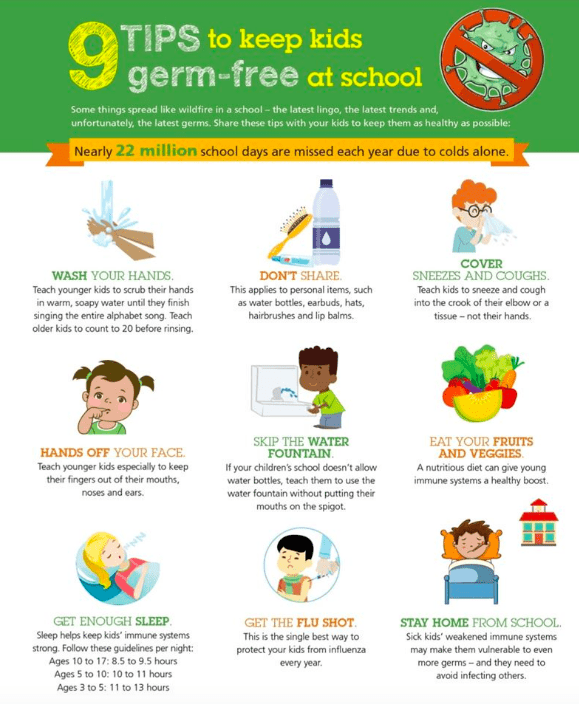With school back in session, and the weather turning cold, it’s the time of year that many people dread — cold and flu season. There’s a good chance your kids are going to come home with more than just homework. We’ve all had those years where the germs in our home never seem to go away. As soon as one person recovers — someone else gets sick. It can be a frustrating and discouraging cycle. Fortunately, there are several things you can do to help reduce the chances of this happening to you and keeping your kids germ-free.
How To Keep Your Kids Germ-Free
Some things spread like wildfire in a school — the latest lingo, the latest trends, and, unfortunately, the latest germs. Share these tips with your kids to keep them as healthy as possible.
Wash Your Hands
This is the best way for your kids to stop germs from spreading. Kids touch countless things in a day and even if your kids do a good job of keeping clean, there are others out there that don’t. There is really no way to avoid coming into contact with germs which is why it is so important to teach your kids to wash their hands. And the right way and times to do it. Teach your kids to wash their hands at the following times:
 when their hands are dirty
when their hands are dirty- before eating or touching food
- after using the bathroom
- after blowing their nose or coughing
- after touching pets or other animals
- after playing outside
- before and after visiting a sick relative or friend
It is also very important to teach them the right way to wash their hands that will get them clean. Here are some helpful handwashing tips for your kids.
- Use warm or cold (not hot) water when you wash your hands.
- Choose a soap that they are going to be willing to use. Sometimes kids decide they don’t like a certain color, scent, or type of soap. Find something that will get them scrubbing and stick with it.
- Work up some lather on both the front and back of the hands, wrists and between all of the fingers. Make sure they also wash around their nails. Wash for 15-20 seconds. You can have them count to 20, sing the “Happy Birthday” song, or recite the alphabet.
- Rinse and dry well with a clean towel.
Eat Your Fruits And Veggies
A nutritious diet can give young immune systems a healthy boost. Fruits and vegetables are an important part of that. Consider following these basic guidelines for your kids.
- Fruits: Kids should have a variety of fruit — fresh, canned, frozen, or dried. Don’t just give them fruit juice. When they do have juice, it is best to choose 100 percent juice with no added sugar.
- Vegetables: Kids need a variety of fresh, canned, frozen, and dried vegetables. Every week they should have some dark green, red and orange, beans and peas, starches and others.
Follow these daily guidelines for your kids:
- Ages 2-3: 1-1.5 cups of fruit and 1-1.5 cups of vegetables
- Girls ages 4-8: 1-1.5 cups of fruit and 1.5-2.5 cups of vegetables
- Boys ages 4-8: 1-2 cups of fruit and 1.5-2.5 cups of vegetables
- Girls ages 9-13: 1.5-2 cups of fruit and 1.5-3 cups of vegetables
- Boys ages 9-13: 1.5-2 cups of fruit and 2-3.5 cups of vegetables
- Girls ages 14-18: 1.5-2 cups of fruit and 2.5-3 cups of vegetables
- Boys ages 14-18: 2-2.5 cups of fruit and 2.5-4 cups of vegetables
On the other hand, here are some things that they should avoid having too much of.
- Added sugars: This would include things like brown sugar, corn sweetener, corn syrup, honey, etc.
- Saturated and trans fats: These are fats that come from animal sources like red meat, poultry, and dairy products.
Get The Flu Shot
This is the single best way to protect your kids from influenza every year. The Centers for Disease Control and Prevention (CDC) recommends a flu vaccine for everyone who is six months and older. This is especially important for some people who are at a higher risk of health complications from the flu. These include:
- all kids six months to 4 years old
- Kids and teens with an ongoing medical condition, such as asthma or diabetes
- Kids or teens who take aspirin regularly and are at risk for developing Reye syndrome if they get the flu
There are times when a flu vaccine might not be a good option for your kids. Check with a doctor before getting a flu shot for your child if they have ever had a severe allergic reaction to the vaccination or have had Guillain-Barré syndrome.
Flu season is generally from October to May. It is recommended to have your kids receive their flu shot early in the season to give their body time to build up its protection from the flu. Give us a call and come get yours today!

Here are a few more things that can help keep your kids healthy during cold and flu season.
Don’t Share
This applies to personal items, such as water bottles, earbuds, hats, hairbrushes, and lip balms.
Cover Sneezes And Coughs
Teach kids to sneeze and cough into the crook of their elbow or a tissue — not their hands.
Hands Off Your Face
Teach younger kids especially to keep their fingers out of their mouths, noses, and ears.
Skip The Water Fountain
If your children’s school doesn’t allow water bottles, teach them to use the water fountain without putting their mouths on the spigot.
Get Enough Sleep
Sleep helps keep kids’ immune systems strong and has shown to reduce the number of colds kids have. Follow these guidelines per night:
- Ages 10-17: 8.5-9.5 hours
- Ages 5-10: 10-11 hours
- Ages 3-5: 11-13 hours
Stay Home From School
Sick kids’ weakened immune systems make them vulnerable to even more germs — and they need to avoid infecting others. Nearly 22 million school days are missed each year due to colds alone. If more kids stayed home when they are sick and didn’t spread their germs, that number would drop.
Just 4 Kids Urgent Care
Your kids are going to come in contact with germs — lots of them — and especially at school. Teaching them the ways they can help limit those germs can go a long way towards keeping them — and you — healthier and happier. Please give us a call or come and see us if you have any questions about how to keep your kids germ-free.
